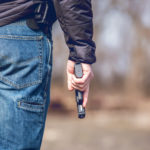Editor’s note: For years we’ve been telling people during the Krav Maga Houston introductory class that self defense is a critical life skill.
Adults need to gain the clarity necessary to squarely understand this perspective. Unfortunately, far too many adults wait until a violent encounter erupts to take meaningful, long term action – but what about kids? How powerfully can we prepare our children for life’s many challenges by explicitly engaging in high quality self defense programming for a number of years. What impact can we have on our children’s lives by meaningfully instilling a sense of worth, confidence, and decisiveness? In the article, below Trea Drake, Krav Maga Houston’s lead kids instructor and multi-level black belt answers this question definitively. Do yourself and your child a favor…read the article below.
Nearly 30% of students are bullied each year, over 160,000 students skip school each day for fear of bullying, 20% of high school girls and 30% of high school boys have been in a fist fight in the last 12 months, and 25% of high schoolers carried a weapon to school in the last 30 days. These statistics don’t even address the likelihood of having to use non-violent de-escalation techniques or self-defense skills over the course of one’s entire life, which is high and trending higher.
I mention these statistics to present the argument that self-defense, and its composite skills of situational awareness, non-violent de-escalation techniques, discipline, cardiovascular fitness, balance, coordination, accuracy, agility, durability, power, speed, and coordination, is a life-skill. I posit that it is an essential life skill, on the level of learning to bathe or brush one’s teeth. However, self-defense is seldom prioritized as such by the general population.
Apathy and denial appear to be the primary drivers with most people holding the perspective that nothing will happen to them or to their child. Just today, I stopped one of our youth students from leaving our school with headphones on her ears and her cell phone in her hand. I informed her of the statistic that 50% of robberies are cell phone related, that such behavior makes her more of a target, and that part of her training is to learn to decrease the likelihood that she is identified as a potential victim by being more situationally aware. Her mother witnessed the conversation and responded with, “I have never thought of that.”
Consistent with this apathy and denial, self-defense training often takes a back seat to organized traditional sports such as baseball, basketball, football, etc. One may argue that many life lessons can be gleaned from participating in such sports, but I argue that the lessons are seldom explicitly taught. Contrast the lessons learned participating in a year of baseball to the character development program at Krav Maga Houston that explicitly teaches lessons on 24-character strengths, common cognitive biases, resilience strategies, mindfulness, and logical fallacies using a variety of pedagogical methods.
I’m not arguing that children shouldn’t participate in traditional sports. What I’m arguing is that self-defense be prioritized differently in relation to traditional sports. I’m arguing that as an essential life-skill that has implications over the course of one’s entire life, self-defense be elevated as the primary activity toward which time is allocated. Thus, traditional sports would not be prioritized to the exclusion of self-defense training, but instead be contingent upon a child’s performance in their self-defense program – similar to the way grades in school dictate whether an athlete is allowed to play.
I often hear parents say that the reason their child is doing other activities, to the exclusion of self-defense training, is because the child doesn’t “like” training in self-defense. My response to that is, “enjoyment” is not a pre-requisite for learning an essential life skill. To this day, I thoroughly dislike the activity of physical exercise. However, I do it anyway because I can appreciate the myriad benefits associated with being in shape. My hypothesis is that most children that protest training in self-defense simply find the physical demands of training to be aversive. However, that is exactly the reason these children need to train in self-defense – to gain fitness, discipline, and resilience.
If your child wakes up tomorrow and decides they are no longer going to take a bath, brush their teeth, or go to school, there is no way you are going to allow them to make that decision. You will object for many reasons, not the least of which is that you recognize your child literally doesn’t possess the gray matter to fully grasp the implications of such nonsense decision making. Yet, when a child says they don’t “like” self-defense training, an essential life skill that has the potential to preserve their life or quality of life, parents behave as if their kids (with their underdeveloped frontal lobe) are suddenly wise and powerful decision makers.
Meanwhile, most children will enter the most violent years of their education career, middle school, woefully unprepared, mentally and physically, for the violence they are likely to encounter, as a victim or witness. Shortly after, they will be exposed to more of the real world as they learn to drive and eventually embark on a college career or other pursuits. All those years in soccer, to the exclusion of self-defense training, will not have prepared them for their encounter with the belligerent drunk guy at the frat party, the driver with road rage that follows them home, or the desperate drug addict with a gun at the local gas station. The time to prioritize training is long before any of these things are likely to happen so that the skills have time to be fully integrated into a life skill your child can apply intuitively and in time of most need.
Bottom line – do the research to identify a high quality self defense program, and get your child enrolled ASAP. You’ll simply never regret arming your child with these life skills.





Andrew Sall
Most people do not view self defense as a life skill because they do not think they will ever need to use the skill. These people are “playing the averages”. People view the probability of themselves being in a violent encounter as extremely low, such that it is a “Black Swan Event”.
As you point out in the article, these events are not as rare as most people would like to think. Even if the probability of a violent encounter is extremely low, the damage that could result from such an attack is extremely severe. Given the potential outcome of a violent attack, self defense training must be given more serious consideration.
Javier
Just awesome, and you are totally right about it!
Dave Blankenship
My kids have enjoyed many years of training and not only has this prepared they for a self defense incident, it’s provided confidence they use every day. And they liked the workouts too!